Live on the homepage now!
Reader Supported News
A new intelligence memo warns of potential violence at a Washington rally planned for later this month — as well as potential threats to Jewish centers and progressive churches
Fear has been mounting for weeks that the “Justice for J6” rally could result in violence. According to the memo, violent online rhetoric surrounding the event has ramped up since Lt. Michael Byrd, the officer who shot and killed insurrectionist Ashli Babbitt when she forced her way toward the House floor, sat down for an interview with NBC’s Lester Holt late last month. The Department of Justice announced in April that it would not pursue charges against Byrd, and the Capitol Police cleared him of any wrongdoing days before he revealed his identity by speaking to Holt. But Trump and his acolytes in Congress and across right-wing media have praised Babbitt while stirring up outrage over her death. Rep. Paul Gosar (R-Ariz.) called it an “execution.” Trump called Byrd a “murderer,” describing Babbitt as someone who “truly loved America.” The former president’s supporters planning on making their way to Washington next week have responded in kind. According to the new memo, some have taken to calling it the “Justice for Ashli Babbitt” rally, raising concerns of the potential for violent retribution.
The memo also notes that online activity indicates the possibility of, as CNN puts it, “violence against Jewish centers and liberal churches while law enforcement is distracted that day.”
There’s a best-case scenario in all this, in which the rally falls flat, drawing only a handful of fringe protesters. That’s always a possibility in a movement whose leaders are long on bluster but short on integrity, but January 6th was a lesson in the consequences of under-preparation.
The Capitol Police will reportedly submit their board with plans for security for the event this week, and one can only hope that they will take the discussion happening online more seriously than they did prior to the January insurrection. A report published by a pair of Senate committees in June detailed how the Capitol Police’s in-house intelligence unit “received information from a variety of sources about threats of violence focused on” January 6th, that the intelligence unit didn’t act on this intel, and that, as a result, “critical information regarding threats of violence was not shared with USCP’s own officers and other law enforcement partners.”
Five people died during the insurrection and in its immediate aftermath, including one Capitol Police officer. The Capitol Police officers’ union said that over 140 officers were injured.
Congress is making sure it’s apprised how the Capitol Police plan to handle the horde of Trump supporters expected to swarm Washington for the rally. House Speaker Nancy Pelosi (D-Calif.) addressed the event for the first time Wednesday morning, claiming those attending are “coming back to praise the people who were out to kill.” Politico reported on Wednesday that Capitol Police Chief Tom Manger will brief Pelosi about security preparations next Monday, and that Pelosi has invited Senate Majority Leader Chuck Schumer (D-N.Y.), Minority Leader Mitch McConnell (R-Ky.), and House Minority Leader Kevin McCarthy (R-Calif.) to sit in on the briefing.
The nature of these precautions is unclear, although CNN reported last month that discussions were taking place as to whether to reinstall the protective fencing set up around the Capitol following the insurrection. That report came days after Capitol Police arrested a man who claimed to have a bomb near the Library of Congress, a scare that only heightened then tension in Washington that had been building ahead of the “Justice for J6” rally, which is being organized by nonprofit called Look Ahead America. Matt Braynard, the former Trump campaign operative who founded the group, issued a foreboding message in announcing the rally on Steve Bannon’s podcast in July.
“We’re going back to the Capitol, right where it started,” Braynard said. “And it’s going to be huge.”
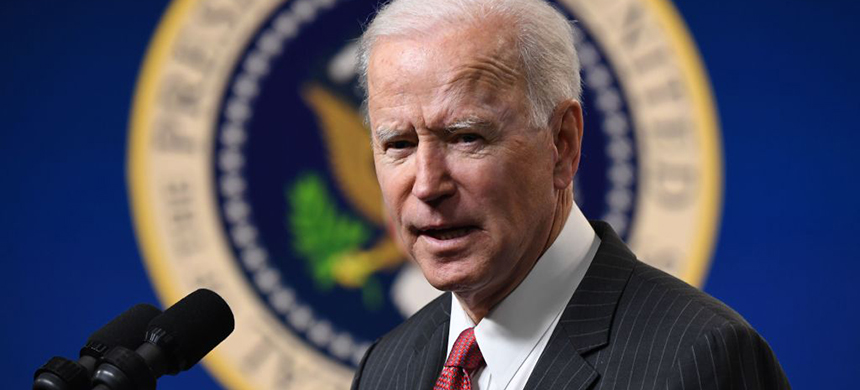 U.S. president Joe Biden in Washington, D.C., 2021. (photo: Saul Loeb/AFP/Getty Images)
U.S. president Joe Biden in Washington, D.C., 2021. (photo: Saul Loeb/AFP/Getty Images)
ALSO SEE: Los Angeles Mandates Student Vaccinations in Nation's
Second-Largest School District
"We're in a tough stretch, and it could last for a while," Biden conceded, as the delta variant of the coronavirus has caused cases, hospitalizations and deaths to rise across the country. But, he added: "We can and we will turn the tide on COVID-19."
Speaking from the White House, Biden said the new emergency rule for private sector employers, which will be issued by the Department of Labor's Occupational Safety and Health Administration, would apply to 80 million workers.
In total, he said the six-pronged strategy he unveiled Thursday would affect some 100 million Americans.
Biden also announced that businesses meeting the 100-worker threshold must give employees paid time off to get themselves or family members vaccinated.
Republicans decry the employer mandate
Many Republicans quickly condemned Biden's proposed rule as federal overreach.
The Republican National Committee on Thursday night announced its plan to sue the Biden administration.
"Forcing main street to vax or pay a fine will not only crush an economy he's put on life support—it's flat-out un-American," House Minority Leader Kevin McCarthy, R-Calif., wrote on Twitter. "To Joe Biden, force is more important than freedom. Americans won't stand for it."
Oklahoma Gov. Kevin Stitt said in a statement: "It is not the government's role to dictate to private businesses what to do. Once again President Biden is demonstrating his complete disregard for individual freedoms and states' rights. As long as I am governor, there will be no government vaccine mandates in Oklahoma."
An NPR/PBS NewsHour/Marist poll last week found that 50% of U.S. adults support employers requiring vaccination to return to in-person work, while 44% do not. The poll did not ask about government mandates for businesses.
The vaccine mandate rule coming from the federal government, as opposed to being individually enforced, will shield many employers from facing the brunt of potential blowback, said employment lawyer Brett Coburn of firm Alston & Bird.
"I'm sure there will be a lot of employers who chafe at this for a variety of reasons, but some employers I think may welcome it," he said. "It kind of takes it out of their hands to some extent to say, 'Sorry, OSHA said we have to do this and we have to follow what OSHA tells us.'
"The CDC gives us guidelines. OSHA gives us rules. And that's a really important distinction," Coburn said, noting that he has seen a growing number of companies in the last month move toward vaccine requirements.
Vaccine requirements for federal workers
Among the other steps, Biden also announced that federal workers and contractors will be required to be vaccinated for COVID-19, eliminating an option laid out in July for unvaccinated employees to be regularly tested instead.
White House press secretary Jen Psaki said federal workers would have about 75 days to become fully vaccinated, once Biden signed an executive order later Thursday. She said there would be limited exemptions for religious or medical reasons.
Some federal agencies will require proof of vaccination while others will accept attestations, Psaki said. Workers who fail to comply with the requirement will be counseled by their human resources departments, and then will face "progressive disciplinary action," she said.
Also announced Thursday, Biden said the Transportation Security Administration would now double the fines for travelers who refuse to wear masks, as public blowups in airports and aboard trains over mask mandates have become a frequent experience for employees of the travel industry.
"If you break the rules, be prepared to pay," Biden said. "And by the way, show some respect. The anger you see on television towards flight attendants and others doing their jobs is wrong. It's ugly."
Similar steps for health workers and teachers
Biden announced that 17 million health care workers at hospitals and other health care settings like dialysis clinics and home health agencies that receive Medicare or Medicaid funding will have to be vaccinated.
There will be similar requirements for teachers and staff at the Head Start early education program and other federally funded educational settings, such as schools on military bases.
The government also plans to boost access to home tests for COVID-19, buying nearly $2 billion in tests for a variety of settings ranging from shelters to food banks. Walmart, Amazon and Kroger will sell home tests at cost for the next three months, according to the White House plan.
The Defense Department plans to send more teams to states where hospitals have reached capacity with COVID patients, and the government also will ship more monoclonal antibody treatments.
"Our patience is running thin"
Biden delivered stern words to America's unvaccinated adults.
"Many of us are frustrated with the nearly 80 million Americans who are still not vaccinated," he said, adding that "a distinct minority of Americans, supported by a distinct minority of elected officials, are keeping us from turning the corner."
About a quarter of U.S. adults have not gotten a vaccine dose, according to the Centers for Disease Control and Prevention.
"My message to unvaccinated Americans is this: What more is there to wait for? What more do you need to see? We've made vaccinations free, safe and convenient," Biden said. "We've been patient, but our patience is wearing thin. And your refusal has cost all of us. So please do the right thing."
The speech comes as the United States has already recorded more than 40 million confirmed cases of the virus, with some 650,000 American lives lost as a result, according to researchers at Johns Hopkins University.
COVID-19 hospitalizations and deaths have spiked recently, due in large part to the delta variant, which experts say appears to be twice as transmissible as the highly contagious original strain. The vast majority of hospitalizations and deaths in the current surge are among the unvaccinated.
Biden has overseen ramped-up efforts to combat the virus through vaccinations and mask usage, but vaccine hesitancy — particularly among white Republicans — and the politicization of masks have hindered the nation in the fight to stamp out the virus.
In his Thursday remarks, Biden also had sharp words for those lawmakers who he said trafficked in politicizing a public health matter.
"These pandemic politics, as I refer to them, are making people sick, causing unvaccinated people to die," he said. "We cannot allow these actions to stand in the way of protecting the large majority of Americans who have done their part and want to get back to life as normal."
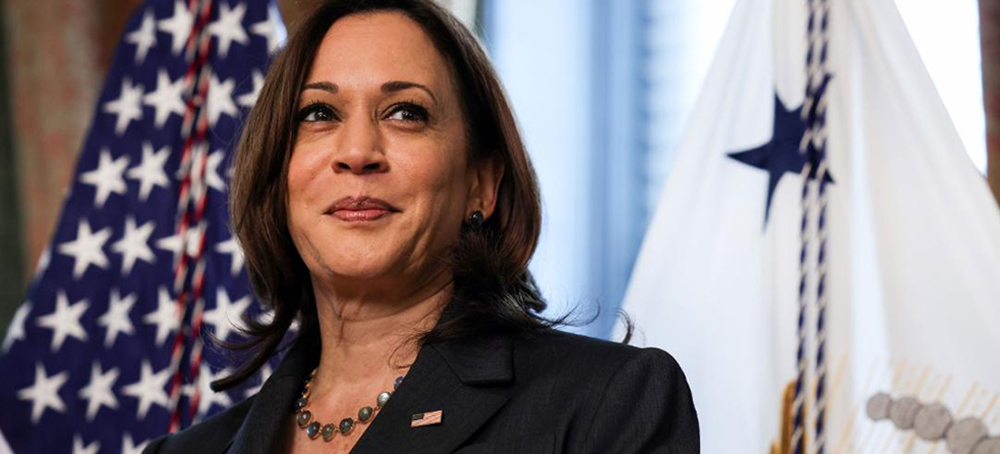 U.S. vice president Kamala Harris. (photo: Getty Images)
U.S. vice president Kamala Harris. (photo: Getty Images)
The US attorney general, Merrick Garland, said the law that went into effect last week after the supreme court refused to block it and bans almost all abortions in the state was one “all Americans should fear”.
Senate bill 8, pushed through by Texas’s Republican-dominated legislature, bans abortion once embryonic cardiac activity is detected, which is around six weeks. Most women are not aware they are pregnant as early as that time.
The justice department decided to argue that the law, which offers no exceptions for rape or incest, “illegally interferes with federal interests”, the Wall Street Journal first reported.
Later on Thursday, Vice-President Kamala Harris said the right of women to make their own choices on reproductive rights and decisions about “their own bodies” was “not negotiable”.
She added that Joe Biden’s and her support for the supreme court’s landmark Roe v Wade decision from 1973, which paved the way for abortion to be legal across the US, was “unequivocal”.
On Monday Garland said the justice department would “protect those seeking to obtain or provide reproductive health services”, under a federal law known as the Freedom of Access to Clinic Entrances.
Garland said that law would be enforced “in order to protect the constitutional rights of women and other persons, including access to an abortion”.
The Texas law incentivizes any private citizen to sue an abortion provider or anyone deemed to have helped a women get an abortion contravening the law. It came into effect on 1 September, and survived an emergency appeal to the supreme court, which voted 5-4 to allow the law to remain in force.
On Thursday, when announcing the lawsuit, Garland said: “The act is clearly unconstitutional” and said that it failed to give women seeking an abortion their constitutional right “at the very moment they need it”.
And he added that the “kind of scheme” that Texas has devised and other states want to follow, where the public enforces the law as a way to avoid legal challenge, and allows individuals to sue abortion providers or those helping a woman obtain the service, was designed to “nullify the constitution”.
Joe Biden condemned the new law and reaffirmed the White House’s support for abortion rights. “This extreme Texas law blatantly violates the constitutional right established under Roe v Wade and upheld as a precedent for nearly half a century,” Biden said in a statement.
The Biden administration has since been under pressure to act, with Democrats on the House judiciary committee writing to Garland on Tuesday, although many experts believe that winning the lawsuit will be a challenge for the federal government.
“The Department of Justice cannot permit private individuals seeking to deprive women of the constitutional right to choose an abortion to escape scrutiny under existing federal law simply because they attempt to do so under the color of state law,” wrote the Democratic members of Congress, who include Pramila Jayapal, representative for Washington, and Val Demings, from Florida.
The Texas law is the strictest legislation enacted against abortion rights in the United States since the supreme court’s landmark Roe v Wade decision in 1973. At least 12 other states have enacted bans early in pregnancy, but all have been blocked from going into effect.
Abortion providers have said the law will probably force many abortion clinics in Texas to ultimately close. Women’s rights advocates fear the conservative-dominated supreme court’s lack of action over the law could signal the start of the unravelling of Roe v Wade.
Harris said on Thursday that no legislative body had the right to circumvent the US constitution.
Harris, who was speaking to reporters at a meeting with abortion providers and patients, said the right of women to make decisions about their own bodies was “not negotiable”.
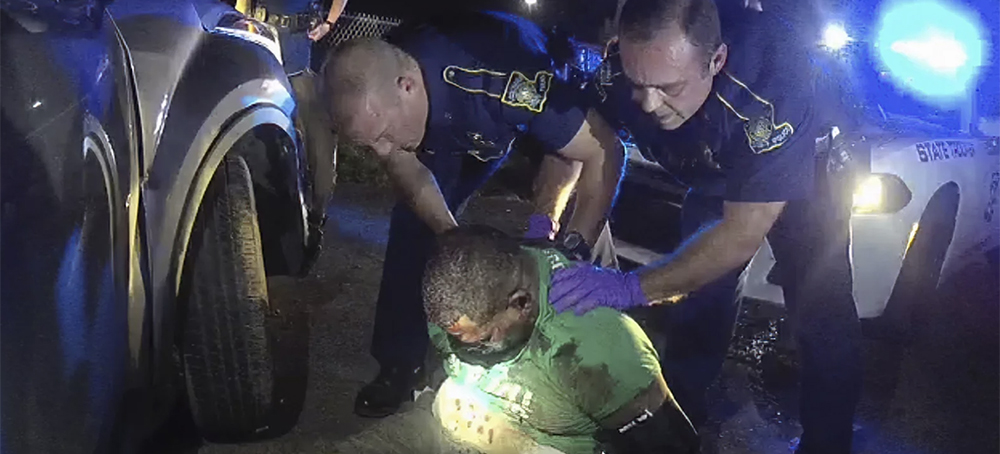 Body cam video shows Louisiana state troopers stunning, punching and dragging Ronald Greene as he apologizes for leading them on a high-speed chase, footage authorities refused to release in the two years since Greene died in police custody. (photo: Dakota DeMoss/Louisiana State Police/AP)
Body cam video shows Louisiana state troopers stunning, punching and dragging Ronald Greene as he apologizes for leading them on a high-speed chase, footage authorities refused to release in the two years since Greene died in police custody. (photo: Dakota DeMoss/Louisiana State Police/AP)
In one video, white troopers can be seen slamming a Black man against a police cruiser after finding marijuana in his car, throwing him to the ground and repeatedly punching him — all while he is handcuffed.
In another, a white trooper pummels a Black man at a traffic stop 18 times with a flashlight, leaving him with a broken jaw, broken ribs and a gash to his head. That footage was mislabeled and it took 536 days and a lawsuit for police to look into it.
And yet another video shows a white trooper coldcocking a Hispanic drug trafficking suspect as he stood calmly by a highway, an unprovoked attack never mentioned in any report and only investigated when the footage was discovered by an outraged federal judge.
As the Louisiana State Police reel from the fallout of the deadly 2019 arrest of Ronald Greene — a case blown open this year by long-withheld video of troopers stunning, punching and dragging the Black motorist — an Associated Press investigation has revealed it is part of a pattern of violence kept shrouded in secrecy.
An AP review of internal investigative records and newly obtained videos identified at least a dozen cases over the past decade in which Louisiana State Police troopers or their bosses ignored or concealed evidence of beatings, deflected blame and impeded efforts to root out misconduct.
AP's review — coming amid a widening federal investigation into state police misconduct — found troopers have made a habit of turning off or muting body cameras during pursuits. When footage is recorded, the agency routinely refuses to release it. And a recently retired supervisor who oversaw a particularly violent clique of troopers told internal investigators this year that it was his "common practice" to rubber-stamp officers' use-of-force reports without reviewing body-camera video.
In some cases, troopers omitted uses of force such as blows to the head from official reports, and in others troopers sought to justify their actions by claiming suspects were violent, resisting or escaping, all of which were contradicted by video footage.
"Hyper-aggressiveness is winked upon and nodded and allowed to go on," said Andrew Scott, a former Boca Raton, Florida, police chief and use-of-force expert who reviewed videos obtained by AP. "It's very clear that the agency accepts that type of behavior."
Most of those beaten in the cases AP found were Black, in keeping with the agency's own tally that 67% of its uses of force in recent years have targeted Black people — double the percentage of the state's Black population. AP reporting revealed that a secret panel the state police set up this year to determine whether troopers systematically abused Black motorists was just as secretly shut down, leaving the agency blind to potential misconduct.
The revelations come as civil rights and Black leaders urge the U.S. Justice Department to launch a broader, "pattern and practice" investigation into potential systemic racial profiling by the overwhelmingly white state police, similar to other probes opened in recent months in Minneapolis, Louisville and Phoenix.
"These things are racially motivated," said Alanah Odoms, executive director of the ACLU of Louisiana. "It doesn't seem you could have this level of criminality going on without it being something much more sinister."
It's not clear how the Louisiana State Police rate of force against Black people compares to that of other states because there is no national benchmark and definitions of uses of force differ between jurisdictions. Activists, however, say it points to a clear problem.
"Driving while Black is still a crime in Louisiana," said Eugene W. Collins, president of the Baton Rouge branch of the NAACP, adding that the numbers "prove our assertion that our communities are woefully over-policed."
Col. Lamar Davis, the state police superintendent, declined requests for an interview but said in a statement that the agency has completely revised its excessive force policies and practices and implemented numerous reforms in the 11 months since he took office.
"No instance of excessive force is acceptable," he said, "and when the department learns of such misconduct, an immediate review is launched leading to administrative and/or potential criminal investigations."
Davis said transparency is a priority but "ongoing criminal and civil litigation prevents the immediate release of videos and investigative details in many of these incidents."
He said he doesn't believe a federal pattern and practice investigation is needed "at this time." The Justice Department did not answer questions about whether it's considering one.
The state police have been under intense scrutiny since May when the AP published previously unreleased body camera footage of Greene's May 10, 2019, arrest at the end of a high-speed chase near Monroe. It showed white troopers stunning, beating and dragging Greene as he pleaded for mercy. One clip that a supervisor denied having for two years showed troopers leaving the heavyset Greene prone and shackled facedown for more than nine minutes. Among the 49-year-old's last words: "I'm your brother. I'm scared! I'm scared!"
It was a jarring rush of images in a death that troopers initially blamed on a car crash and that took 474 days to prompt an internal investigation. Gov. John Bel Edwards was among the officials who repeatedly rebuffed requests to release the video.
"These are tactics they've been using forever and we're tired of it," said Terrance Key, an Army veteran who grew up with Greene in northern Louisiana. "They've been getting away with this s--- for so long."
Recently, a federal investigation into Greene's death was broadened to include allegations of obstruction of justice involving Louisiana State Police brass. Among the incidents under scrutiny is the shutdown of the secret panel state police set up to investigate possible systemic abuse of Black motorists.
The seven-member panel had been focused on reviewing thousands of hours of body camera footage from about a dozen specific troopers in northern Louisiana's Troop F, including some of those involved in the beatings of Greene and three other Black motorists.
But according to several people familiar with the matter who spoke to AP on condition of anonymity, the panel was abruptly disbanded in July after just a few months' work following leaks about its existence. State police did not immediately act on the panel's recommendations, but Davis said the agency has since referred some of the problematic incidents to internal investigators. He did not identify those incidents.
Among the cases identified by AP's review is a March 2019 arrest in northeastern Louisiana's Ouachita Parish where a trooper was caught on dash-camera video grabbing Black marijuana suspect Deshawn Washington by his hair and slamming the 20-year-old into the hood of a police cruiser, a use of force omitted from the police report. At one point, Washington's friend, Shomari King, a 21-year-old who was also arrested, asked, "Why y'all being so rough?"
In another case from August 2019, Darrell Smith, a white motorist who fled a traffic stop near Baton Rouge, contended in a lawsuit that troopers caught up with him and beat him beyond recognition, causing him to be hospitalized with temporary kidney failure. A use-of-force report leaves unchecked whether body-camera video exists and lists Smith's injuries as "nonincapacitating." Smith's lawsuit says troopers shared a photo of him after the beating with his eyes swollen shut and the caption: "This is what happens when you run from the police."
Sometimes, videos have been left out of materials turned over to state prosecutors. That was the case last year after a high-speed chase ended near a Franklin Parish cornfield, where body cameras captured troopers beating Black motorist Antonio Harris and hoisting him to his feet by his hair braids.
Afterward, the troopers bragged about it in LOL-peppered group text messages, saying Harris is "gonna have nightmares" and is "still digesting that ass whoopin'."
Capt. John Peters, the regional troop commander, recently retired after acknowledging he approved troopers' use-of-force reports that glossed over Harris' beating without reviewing their body-camera video, disciplinary records show. Peters, who was also among the commanders to sign off on the use-of-force reports in the Ronald Greene case, told investigators that approving such documents without watching the video was his "common practice." He declined to comment to AP.
"The ultimate responsibility is mine," records show Peters wrote in an internal email about the approvals last year. "I failed."
One former trooper, Jacob Brown, was perhaps the agency's most prolifically violent officer in recent years. Records show he tallied 23 uses of force dating to 2015 — 19 on Black people — and he faces charges in three separate beatings.
Video and police records show he beat Aaron Larry Bowman 18 times with a flashlight after deputies pulled him over for a traffic violation near his Monroe home in May 2019. State police didn't investigate the attack until 536 days later, and only did so after a lawsuit from Bowman, who was left with a broken jaw, ribs and wrist, as well as a gash to his head that required six staples to close.
"I thought I was going to die that night," Bowman told AP.
Brown, who resigned in March, failed to report his use of force and mislabeled his body-camera footage in what investigators described in internal records as "an intentional attempt to hide the video." He did not respond to messages seeking comment.
Another video obtained by the AP involving Brown shows the 2019 arrest of Morgan Blake, who was handcuffed by the side of a Louisiana interstate after troopers found 13 pounds of marijuana in his car.
When Blake repeatedly begged Brown to adjust the cuffs, saying they were irritating an old elbow injury, the trooper refused and slammed Blake twice against a police cruiser and then hurled him to the ground.
Two more troopers jumped on Blake, who was still handcuffed, in the roadside grass. "Stop resisting," one of them yelled. Footage shows Trooper Randall "Colby" Dickerson punching Blake five times and kneeing him in the side. Dickerson, who faces state charges in the case, declined to comment.
After the beating, Brown told another trooper that Blake's right handcuff hadn't been on, that he was resisting and, "Hell, he's trying to get away" — all statements investigators concluded were false.
AP also obtained previously unreleased footage of a state trooper hitting a Hispanic truck driver in 2010 along Interstate 12 in Tangipahoa Parish, north of New Orleans.
The driver, Alejandro Soliz, had been transporting more than 20 kilograms of cocaine and waited on the side of the road as troopers searched his tractor-trailer. Trooper Jason LaMarca can be seen approaching Soliz and, without provocation, delivering a blow to the head that sent the man crumbling to the ground.
"There is absolutely no legitimacy in that type of force," policing expert Scott said after viewing the footage.
LaMarca, reached by phone, referred questions to a police spokesman, who did not respond.
The federal judge who sentenced Soliz on drug charges five months after the arrest was so troubled by the video that he wrote letters to federal prosecutors and Col. Mike Edmonson, then-superintendent of the state police. The use of force had not been documented in any reports, the judge wrote, adding the video also showed "three other troopers laughing at this act."
Edmonson ultimately suspended LaMarca for 12 hours, saying the punishment was tempered by what he considered an "outstanding" seizure of $2 million worth of cocaine.
At a disciplinary hearing, Edmonson talked about wanting to send LaMarca a message that striking Soliz was "not why we wear this badge."
The trooper's suspension was overturned on appeal.
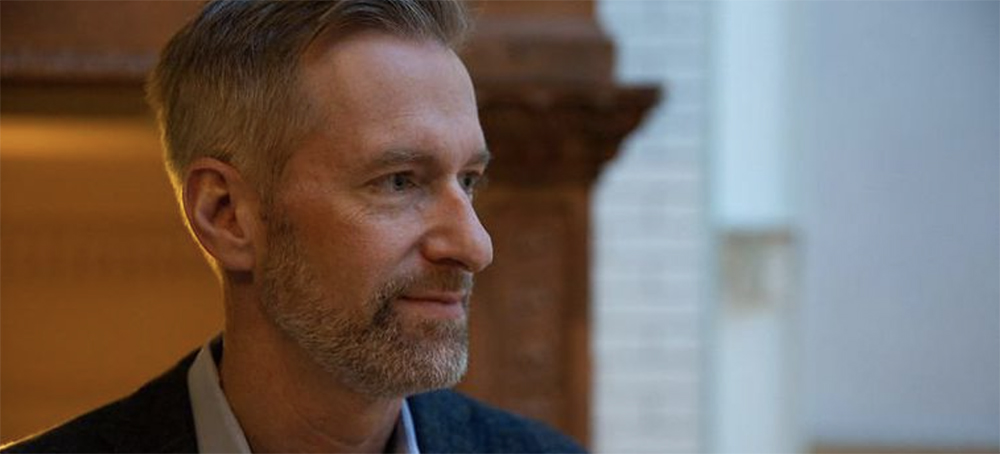 Portland Mayor Ted Wheeler. (photo: Kaylee Domzalski/OPB)
Portland Mayor Ted Wheeler. (photo: Kaylee Domzalski/OPB)
“We urge other leaders and elected bodies around the nation to join us in condemning the actions of the Texas state government.”
Portland Mayor Ted Wheeler made the announcement on Friday, stating, “The Portland City Council stands unified in its belief that all people should have the right to choose if and when they carry a pregnancy and that the decisions they make are complex, difficult, and unique to their circumstances.”
“We urge other leaders and elected bodies around the nation to join us in condemning the actions of the Texas state government,” Wheeler added.
Texas’ new law has made it illegal to access or provide an abortion in the state after the sixth week of pregnancy.
Everyday citizens and as well as government officials have spoken out and taken steps to combat the law.
TikTokers protested an online tip line that was created by the anti-abortion rights group Texas Right to Life, aiming to enforce the law by encouraging people to report violators, by inundating the tip line with memes, fake reports and porn.
On Friday, Attorney General Merrick Garland said he and the Justice Department would protect the reproductive rights of citizens by enforcing the FACE Act, which “prohibits the use or threat of force and physical obstruction that injures, intimidates, or interferes with a person seeking to obtain or provide reproductive health services.”
“While the Justice Department urgently explores all options to challenge Texas SB8 in order to protect the constitutional rights of women and other persons, including access to an abortion,” Garland said in a statement, “we will continue to protect those seeking to obtain or provide reproductive health services pursuant to our criminal and civil enforcement of the FACE Act … We will not tolerate violence against those seeking to obtain or provide reproductive health services, physical obstruction or property damage.”
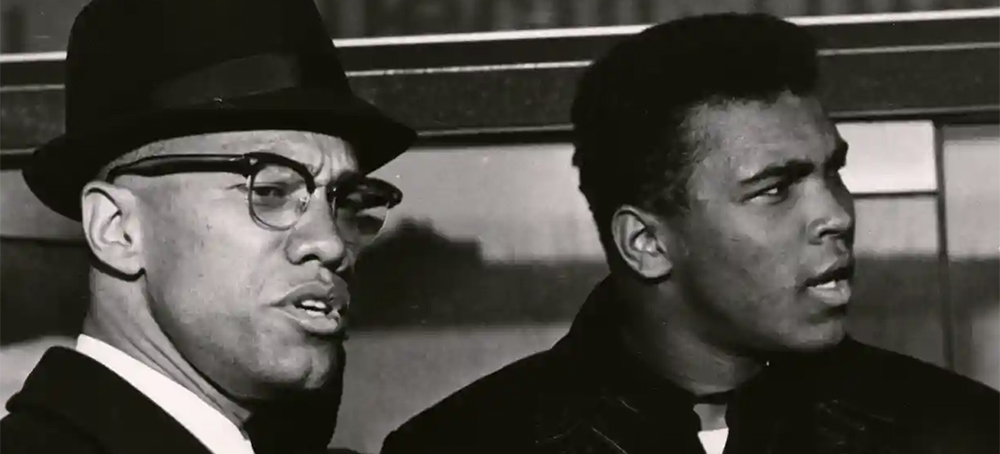 Malcolm X and Muhammad Ali. (photo: Netflix)
Malcolm X and Muhammad Ali. (photo: Netflix)
In a new Netflix documentary, film-maker Marcus A Clarke explores the relationship between the two civil rights figures
But in his Netflix documentary, Clarke digs further into the men and their environment, with archival material and first-hand accounts from X’s daughter Ilyasah Shabazz, Ali’s younger brother Rahman and several others who knew them or understood the political and social environment they were up against.
We get a sense of Malcolm X’s ferocity with words but also his tenderness and vulnerability among brethren. And then there’s Muhammad Ali: he had a loud mouth too, but as heavyweight champion, he made the world shake with his rock-hard fists. He was also a soft sponge when it came to learning from a spiritual father figure and friend like X. “There’s just this admiration and joy being shared between the two of them,” Clarke told the Guardian over a Zoom call from his LA home. “And that’s something I don’t think people have necessarily seen before.”
Blood Brothers, which is produced by the creator of Black-ish, Kenya Barris, adapts Randy Roberts and Johnny Smith’s book about X and Ali’s relationship, drawn from heavy research into past biographies, documents and FBI surveillance records. Roberts and Smith also appear in the film. And in an era where authorship and identity packs so much meaning and implication, I’d be remiss if I didn’t point out that the two authors are white.
“Whether they’re white or Black, there’s a lot of value in the research,” says Clarke, who was born in Brooklyn to Jamaican parents. Clarke adds that he saw an opportunity to balance the scholarly work of Roberts and Smith with more intimate accounts from those close to X and Ali, while exploring social and cultural details that the book doesn’t consider to the same extent.
If Roberts and Smith’s book connected the dots to give the relationship between X and Ali shape, Clarke’s documentary colours it all in with an understanding of what it means to be Black in America. He latches on to how Muhammad Ali, who was then known as Cassius Clay, would have been affected in transformative ways by the lynching of Emmett Till, comparing that experience to how Black youth today respond to images of police brutality. The documentary also presents details about Malcolm X’s parents, who followed Marcus Garvey. The Black nationalist leader’s Pan-African movement is echoed in X’s own principles, treating Black and brown oppression as a global issue. “These are at the foundation of who he was,” says Clarke.
There are also musical asides in the doc, which home in on how Bob Marley’s sounds figured into the movement, or how the Nation of Islam leader Louis Farrakhan had a career as a calypso singer under the moniker The Charmer. Such details may seem out of place in a doc about X and Ali, but they are part of the cultural fabric that would nurture and inspire the activists. “I tend to believe that our film has a great deal of soul for that reason,” says Clarke. “For Black people, music and storytelling have always been symbiotic. For so long our history has been told through song. Messages have been put into song.”
I can’t help but pay attention to the wall behind Clarke showing off a telling curation of personal history and popular culture. There’s a Warhol-like poster of Marilyn Monroe and another from the movie Attack of the 50 Foot Woman. Both flank a large print of Sunday’s Best, the 1941 photograph of young Black boys in Chicago’s South Side sitting on a Pontiac while dressed to attend church for Easter. That print is mounted just above a framed ticket to the first inauguration of Barack Obama, who spent his formative years on Chicago’s South Side. All of that sits above a framed photo of the director’s grandmother.
I’m scouring these details on the wall, in the same way the filmmaker wades through those cultural signifiers in X and Ali’s own life, hoping to arrive at some deeper understanding into the influences on his work, which tends to mine the intersection between popular culture and social activism.
Clarke got his start as a teenage intern and then production assistant for a company that made television commercials for brands like Pizza Hut and Danone. He worked on the kind of spots where warm cheese stretches in slow motion, or a candy bar splashes in a pillowy pool of chocolate. “Basically I worked for Willy Wonka,” says Clarke. He was also often the only Black person in the room or on set at a time when no one was pushing to diversify the talent behind the camera.
After Eric Garner’s death in police restraint, Clarke grabbed what resources he had to go out on the street and document the Black Lives Matter protests shutting down New York City, the material becoming one of his first shorts: 2014’s I Can’t Breathe. “That opened up the lane of possibilities for how I can start to fuse more messaging and really say something with the films that I was doing,” says Clarke.
He went on to explore southern rap’s social underpinnings in the Mass Appeal short Trap City and followed rapper TI on a political and activist journey in an episode of Netflix’s hip-hop doc series Rapture. And then he came to Blood Brothers, retelling the story of Malcolm X and Muhammad Ali at a time when the potency of their activism speaks to the overwhelming pain and anger following George Floyd’s murder.
Malcolm X’s words resonate today, says Clarke. He also sees a lesson to be learned from the leader’s tragic fallout with Ali. Clarke’s documentary gets into the outside forces and pressures that caused the fissure between X and Ali, subversive influences which the director points out are still at work today. Consider the scrutiny at Black Lives Matter over how resources are allocated, the disinformation spread about protesters by the far right and the FBI surveillance on Black activists echoing the agency’s Cointelpro tactics to disrupt social movements.
“People who are Black and brown, who are trying to achieve something, who have a mission, who feel like they have a purpose towards something, have to keep in mind that there’s always going to be forces at work trying to slow them, stop them or divide them,” says Clarke.
“We need more solidarity. This is what Malcolm was about. We have the same mission. Whether you’re in America, Africa, or the Caribbean, wherever Black and brown people are, we’re facing the same oppression.”
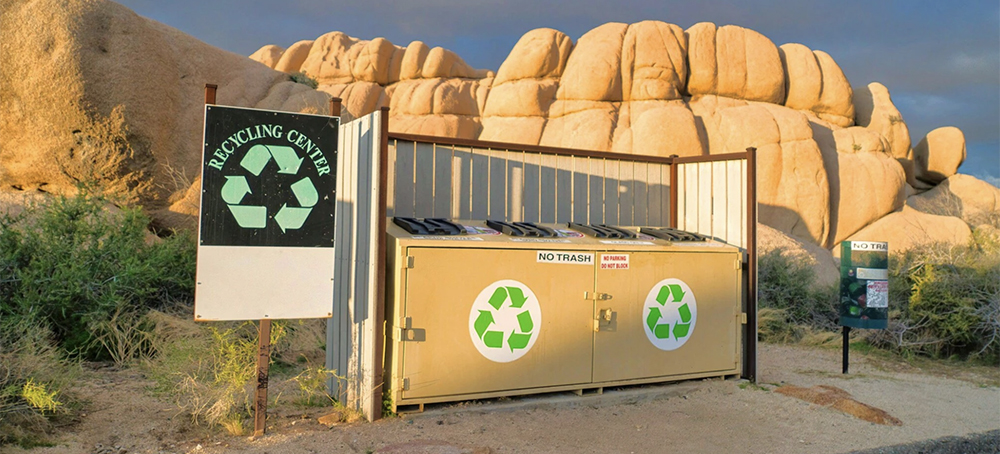 Bins for recyclables at Joshua Tree National Park. (photo: Jason Finn/Alamy Stock Photo)
Bins for recyclables at Joshua Tree National Park. (photo: Jason Finn/Alamy Stock Photo)
The well-known three-arrows symbol doesn’t necessarily mean that a product is actually recyclable. A new bill would limit the products allowed to feature the mark.
What a lot of shoppers might not know is that any product can display the sign, even if it isn’t recyclable. It’s false advertising, critics say, and as a result, countless tons of non-recyclable garbage are thrown in the recycling bin each year, choking the recycling system.
Late on Wednesday, California took steps toward becoming the first state to change that. A bill passed by the state’s assembly would ban companies from using the arrows symbol unless they can prove the material is in fact recycled in most California communities, and is used to make new products.
Follow us on facebook and twitter!
PO Box 2043 / Citrus Heights, CA 95611

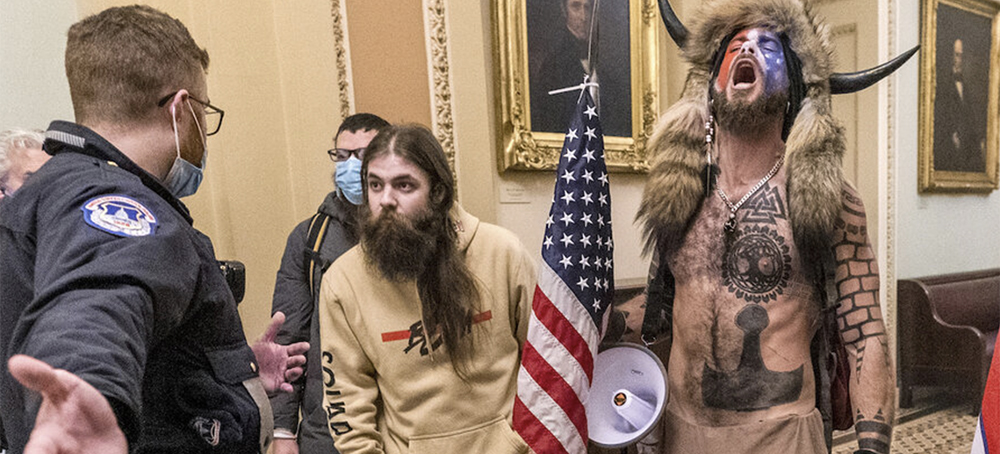

No comments:
Post a Comment